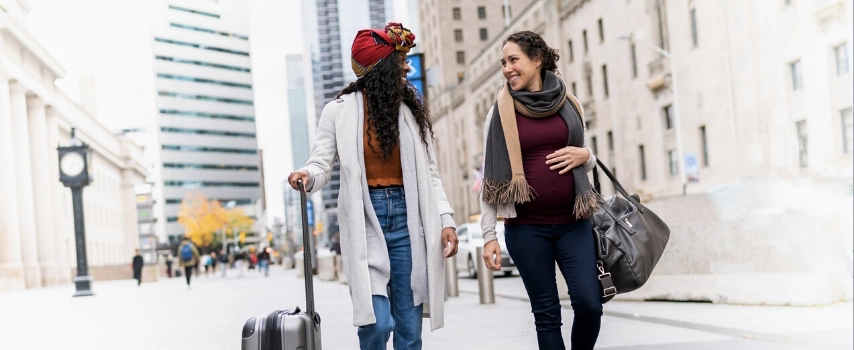9 Questions All Pregnant Travellers Should Ask

Travelling while pregnant? Here’s what you need to know
Pregnancy is often an exciting adventure for expectant families – but the idea of travelling while pregnant can often lead to questions or concerns.
Is travelling while pregnant safe? Is it wise to get on a long-haul flight while pregnant? Is it safe to travel to Bali while pregnant?
Finding the right travel insurance with pregnancy cover can help ease your mind if you choose to travel while pregnant, but there are many other things to learn before you pack your bags.
Here, we’ve collated useful advice and information to help make travelling while pregnant less confusing.
From finding out what vaccinations you should have – and if you should have them – to how to reduce the risk of deep vein thrombosis, you’ll learn the answers to nine questions all pregnant travellers should ask when planning a trip.
Skip ahead to read:
- Do I need a doctor's letter for travelling while pregnant?
- What is deep vein thrombosis (DVT) and am I at risk?
- What vaccinations should have if travelling while pregnant?
- Is COVID-19 a risk if I'm pregnant?
- Is the Zika virus a risk if I'm pregnant?
- What food should I avoid when travelling while pregnant?
- Is it safe to go on a "babymoon"?
- What should I pack if travelling while pregnant?
- How can I make travelling while pregnant more comfortable?
#1. Do I need a doctor's letter for travelling while pregnant?
Pregnant travellers should obtain a letter from their obstetrician or midwife explicitly stating their weeks of pregnancy and due date, and health status of the pregnancy where possible.
Some pregnancies can be complicated, and those pregnant with their second or third baby can look more pregnant than they really are – a medical letter will help avoid issues with airline staff, tour operators and more.
Most airlines have restrictions around how late into a pregnancy a passenger can fly. To find out what common airline restrictions are in place for pregnant travellers, and what medical documentation you might need, check out our guide here.
#2. What is deep vein thrombosis (DVT) and am I at risk?
Planning to take a long-haul flight when pregnant? It’s important to learn about deep vein thrombosis as well as ways to help reduce your risk of developing it.
Professor Hannah Dahlen from Western Sydney University – who is internationally renowned in midwifery – recommends pregnant travellers should not be frightened of flying but take some simple precautions to help make flying longer distances safer.
“Deep vein thrombosis is more common when you’re pregnant,” she explains.
“You’re more likely to have changes in your blood profile as well, which can enable clots to develop more easily.
“It’s really important to move around regularly and rotate your ankles, to wear flight socks, and to make sure you’re well hydrated.
“To ensure you’re able to do all of this, I’d advise opting for an aisle seat, which will also make it easier to get to the toilet frequently.”
In-flight brochures can also be a handy resource for exercise suggestions designed to reduce the risk of blood clots.
Those with a history of DVT – for example, those who had it in a previous pregnancy – or who are known to be at a higher risk should seek extra medical advice.
“They may need to be on an anti-coagulant to help stop their blood from clotting,” Professor Dahlen says.
On long-haul flights during pregnancy, Professor Dahlen also recommends stopping halfway, even staying overnight in another country en route.
Allowing time for a longer stopover is helpful for DVT, but it also helps give pregnant bodies a break because flying can have more of a physical impact than usual. For example, the feet can become even more swollen than usual.
#3. What vaccinations should I have if I’m travelling while pregnant?
“The two key vaccinations recommend to most women in high-income countries during pregnancy are flu and whooping cough or pertussis,” says Professor Euan Wallace, Head of Department of Obstetrics and Gynaecology at Monash University.
“This is largely for the safety of the baby but also for the safety of themselves.”
If you’re travelling to a country where a specific vaccination is usually required or recommended prior to entry, seek advice from a doctor who specialises in travel medicine or visit a travel clinic.
They will be able to advise if vaccines are required and suitable for pregnant women. Any recommended vaccines will likely be split into the below two vaccine groups:
- Inactivated vaccines: there is no live virus contained in the vaccine, making them generally safe during pregnancy; and
- Live attenuated vaccines: there is live virus contained in the vaccine, so they aren’t usually given to women in pregnancy.
If you’re concerned about vaccinations for travelling while pregnant, visit your local travel clinic prior to booking your overseas travel.
#4. Is COVID-19 a risk if I'm pregnant?
The impact of COVID-19 has been felt around the world – and the risks of experiencing illness from this coronavirus increase if you have existing medical conditions, including during pregnancy.
According to the Centres for Disease Control and Prevention (CDC), pregnant people and recently pregnant people have an increased risk of severe illness from COVID-19 when compared to non-pregnant people.
Pregnant people with COVID-19 are more likely to experience preterm birth (delivering the baby earlier than 37 weeks) and might be more likely to have other poor outcomes related to pregnancy, such as pregnancy loss, compared to pregnant people without COVID-19.
Carefully consider the COVID-19 risks if you plan on travelling while pregnant and seek advice from smartraveller.gov.au and your doctor when deciding if it’s safe to travel to your chosen destination.
#5. Is the Zika virus a risk if I'm travelling while pregnant?
According to Professor Wallace, yes – the Zika virus is an issue for pregnant travellers because of the potential for brain damage in an unborn baby.
To help travellers who are pregnant or planning to get pregnant, the World Health Organisation has classified countries according to risk of transmission: Category 1 being high risk because of ongoing transmission, to Category 4 with no known documented past or current transmission.
Professor Wallace says advice for pregnant women planning their travel is to avoid Category 1 and 2 countries.

#6. What food should I avoid when travelling while pregnant?
Pregnant travellers should be mindful of water hygiene and consumption of unpasteurised products, says Professor Wallace.
“In Australia, by law, all our milk is pasteurised, which includes all of the cheeses made here.
“In many European countries, you can buy unpasteurised products that have a risk of listeria for pregnant women, particularly with soft cheeses.
“If you’re having dairy products when travelling, ask if the milk is pasteurised and if not, avoid these foods.
“If there is concern about water quality, avoid ice cubes, drink bottled water, and only eat fruit and vegetables you can peel – so avoid tomatoes and salads.”
Traveller's diarrhoea (commonly referred to as Bali belly) is a risk while travelling for anyone but is particularly unpleasant if pregnant.
If you’re travelling to Bali pregnant or other countries where the food might be different to what you usually eat at home, check out these tips on how to avoid Bali belly – and what to do if you happen to contract it.
#7. Is it safe to go on a “babymoon”?
A "babymoon" is a great opportunity for an expectant couple to unwind before their baby arrives, but it’s important to book your trip at a safe time.
The World Health Organisation suggests the safest time for pregnant women to travel is the second trimester (approximately 13-27 weeks), but it’s helpful to note gestation costs for childbirth and neonatal care overseas can be expensive when travelling after 20 weeks; costs that generally aren’t cover by travel insurance.
It’s also important for pregnant couples to be smart about their "babymoon" location and style. Travelling while pregnant does come with increased risks, so choosing a holiday destination that is safe and comfortable is wise.
When planning a "babymoon", you may want to pick a destination where you have access to:
- a large comfy bed
- extra pillows
- good food that has been hygienically prepared
- massages or a day spa
- a nearby hospital or doctor
You may also want to pack the following items for your "babymoon":
- prenatal charts/medical notes
- emergency contact details
- journal
- camera
- water bottle
- comfy clothing and shoes
- prenatal vitamins and any other medication
- travel insurance with pregnancy cover documents
If you’re travelling overseas for your "babymoon", you’ll also likely need:
- compression stockings
- doctor’s letter permitting travel
- thongs or slip-on shoes that are easy to take off on the plane or at customs
- a list of foods to avoid
If you’re thinking about going on a "babymoon" but are concerned if it’s safe – or want to know how far you should travel – speak to your GP before placing any bookings.
#8. What should I pack if I’m travelling while pregnant?
You’ll want to be cosy while on holiday, so remember to travel in comfortable, loose-fitting clothes and flat shoes.
Be prepared for your ankles to swell during travel, too, particularly if you’re taking a long-haul flight while pregnant. So, wear shoes with plenty of room or can be loosened with ease.
Long-distance air travel also dries out the skin, so carry a rich moisturiser with you that’s suitable for both your face and your growing tummy.
Pack comfortable trainers within easy access for when you arrive at your destination so you can get some fresh air and take a short walk if possible. This will help reset your body clock to local time.
Don’t forget to pack all your pregnancy paperwork – including appropriate travel insurance cover for travelling while pregnant.
#9. How can I make travelling while pregnant more comfortable?
For expert pregnancy travel tips, watch Dr Will Milford's advice for travelling comfortably while pregnant:
Still got questions about travelling safely while pregnant?
We’ve got lots of helpful information on our website. Here, you can:
- Learn about our travel insurance with pregnancy cover
- Read our FAQ page for useful information on protecting your trip while pregnant
- Find out about your airline’s restrictions for pregnant travellers
…or you can call our friendly team on 1300 72 88 22 during Australian business hours to speak with someone about our pregnancy cover.
Ready to plan your next adventure?
Find out how we can help keep you safely travelling while pregnant.
Material on this website is provided for informational purposes only. It is general information and discussion about medicine, health and related subjects may not apply to you as an individual and is not a substitute for your own doctor’s medical care or advice. The words and other content provided on this website, and in any linked materials, are not intended and should not be construed as medical advice. If the reader or any other person has a medical concern, they should consult with an appropriately licensed physician or other health care worker. Nothing contained on the website is intended to establish a physician-patient relationship, to replace the services of a trained physician or health care professional, or otherwise to be a substitute for professional medical advice, diagnosis, or treatment. The views and opinions expressed on this website have no relation to those of any academic, hospital, practice, or other institution with which the authors are affiliated. They do not necessarily reflect the opinions of Cover-More Insurance Services Pty Ltd. Never disregard medical advice or delay seeking medical care because of something you have read on or accessed through this website. If you think you may have a medical emergency, call your doctor or emergency services immediately.